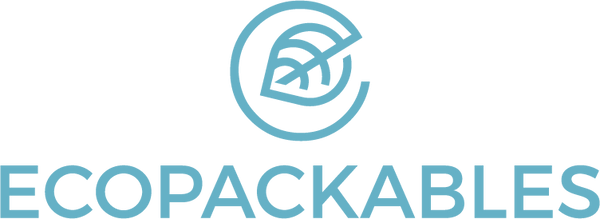In today’s environmentally conscious world, “plastic-free” has become a buzzword. But the truth is, the term “plastic” encompasses a wide variety of materials, some of which don’t fit the narrative of being universally harmful. This article delves into the nuances of plastics, bioplastics, and compostable options, helping you make informed decisions about sustainability in packaging.
What Is Plastic, Really?
At its core, plastic refers to a material made of long chains of molecules called polymers. These polymers can be derived from various sources, including fossil fuels (like petroleum) and renewable materials (like corn starch or cassava). While most people associate plastic with fossil-based materials, the definition doesn’t inherently mean “bad.”
Fossil-Based Plastics
The primary issue with traditional plastics lies in their source—non-renewable fossil fuels—and their end-of-life impact. These materials take hundreds of years to degrade and often contribute to pollution in landfills and oceans. Avoiding fossil-based plastics is one of the most impactful steps toward sustainability.
Bioplastics and Compostable Plastics
Bioplastics and compostable plastics are derived from renewable resources like plants, but they’re still technically plastics. They offer benefits such as lower carbon footprints and potential biodegradability. However, their effectiveness depends heavily on the proper infrastructure for composting and recycling, which is often lacking.
What Does "Plastic-Free" Really Mean?
The term "plastic-free" has become a popular label in the sustainability world, but it’s worth questioning whether it’s truly the best goal to strive for. Plastic, as a material, isn’t inherently bad—it’s versatile, lightweight, and durable. The real problem lies in the type of plastic, how it’s produced, and how it’s disposed of. Fossil-based plastics, for instance, are derived from non-renewable resources and often persist in the environment for centuries, contributing to pollution and climate change. On the other hand, bioplastics and compostable plastics, while still technically "plastic," can offer renewable alternatives and improved end-of-life options. Instead of aiming solely for “plastic-free,” the focus should shift to prioritizing renewable, responsibly sourced, and easily recyclable or compostable materials that minimize environmental harm.
This nuanced approach recognizes that not all plastics are created equal and that the solution to our packaging challenges is more complex than simply eliminating one category of materials.
The Challenges of Compostable Plastics
Compostable plastics are a promising alternative, but they come with their own set of challenges:
- Inadequate Composting Infrastructure Compostable plastics require specific conditions to break down, such as high temperatures found in industrial composting facilities. Unfortunately, these facilities are not yet widespread, leading to compostable plastics often ending up in landfills.
- Ocean Non-Degradability While some compostable plastics are biodegradable in controlled environments, many do not break down in the ocean. This poses a risk to marine life, as these materials may still persist and cause harm if they end up in our waterways. There is a separate category known as ocean biodegradable plastics, which are specifically engineered to break down in seawater without harming marine ecosystems.
- Advocating for Better Systems The solution lies in improving composting infrastructure and legislation. By creating demand for compostable products, businesses can play a role in driving these necessary changes.
The Only Truly Plastic-Free Options
When it comes to truly plastic-free materials, paper stands out as the go-to option. However, even paper packaging isn’t perfect, especially when it comes to packaging made for food contact:
- Plastic Coatings on Paper Many paper products have plastic coatings to provide water resistance, making them unsuitable for recycling or composting.
- PFAS in Paper Paper products treated with per- and polyfluoroalkyl substances (PFAS) for grease resistance can pose significant environmental and health concerns. Avoiding PFAS-coated paper is critical to ensure packaging remains truly sustainable.
Ecopackables' Commitment to Truly Plastic-Free Paper Packaging
At EcoPackables, we’re proud to offer paper packaging that is genuinely plastic-free. Our paper products are free from plastic coatings and PFAS, ensuring they are both recyclable and compostable. Not only that, but our paper packaging is also made with 100% recycled content, adding to its sustainability credentials. By choosing recycled materials, we help reduce the demand for virgin paper and preserve valuable resources.
The Balancing Act: Education and Awareness
There is no perfect packaging material. Every choice comes with trade-offs, whether it’s the weight of paper, the infrastructure challenges of compostable plastics, or the persistence of fossil-based plastics. The key lies in understanding these complexities and making thoughtful decisions.
Why We Sell Compostable Plastics
At EcoPackables, we offer compostable plastics not because they’re a perfect solution, but because they represent a step toward sustainability. By increasing demand for compostable products, we aim to drive change in the industry, including better composting infrastructure and stricter regulations.
What Should Businesses Do?
- Educate Consumers: Use your packaging to tell the story of its composition, proper disposal methods, and why your company made the switch.
- Advocate for Better Systems: Support legislation that enhances composting and recycling infrastructure to make sustainable options more effective.
- Choose Materials Thoughtfully: Consider the end-of-life impact of each material and align your choices with your brand’s sustainability goals.
Final Thoughts
The word “plastic” encompasses a wide range of materials, some of which are more sustainable than others. While terms like “plastic-free” are appealing, they can oversimplify the challenges of sustainable packaging. By understanding the nuances of plastic, compostable materials, and paper alternatives, businesses can make informed choices and contribute to a more sustainable future.
At EcoPackables, we’re here to help navigate these complexities, offering solutions that balance sustainability with practicality. Let’s work together to make packaging smarter, more sustainable, and better for the planet.

